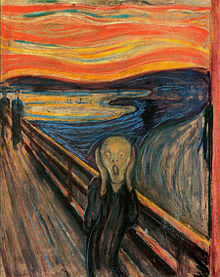Unhinged by the Epidemic of Mental Illness

“The central question of what variables drive the pathophysiology of mood disorders remains unanswered……….It is therefore no surprise that we know almost nothing definitive about the pathophysiology of mental illness — the surprise is that we know anything at all.”
From Unhinged, The Trouble with Psychiatry — A Doctor’s Revelations about a Profession in Crisis, by Daniel J. Carlat, M.D.
Depakote, Seroquel, Trileptal, Klonopin, Inderal (Propranolol), Lamictal (Lamorgine), Abilify, Roxerem, Neurontin, Lithium, Resperdal, Lunesta, Lexapro, Effexor, Cymbalta, Trazadone, Ritalin, Nuvigil, Provigil, Topomax, Artane, Primidone and Carbidopa/Levodopa are all drugs I have taken at one time or another for the pathophysiology of my mental illness and the side effects of these drugs. Those side effects have been weight gain, anhedonia (the inability to find pleasure from activities previously found enjoyable), and tremors. From reading Dr.Carlat’s book and Robert Whitaker’s “Anatomy of an Epidemic” it is evident that the medical profession has no clear idea how these drugs work or how they work together. They are shooting in the dark based on spotty clinical evidence. It is only we the users who can verify if these drugs work. Sometimes they do, and sometimes they don’t. It all depends on the individuals and the knowledge of the medical professionals handing out the prescriptions.
I am in dismay and almost unhinged by this revelation and all the corollary issues that this essential fact raises. These facts make me wonder about the efficacy of psychopharmacology altogether. I bought into the chemical imbalance theory, which states that a person with mental illness is suffering from a biochemical imbalance in the brain. Now I find out that this is just a convenient metaphor, which destigmatizes the condition and makes mental illness not the sufferer’s fault. I learned from a quote by Dr. Hyman of Harvard University sited in the “Anatomy of an Epidemic.” that:
“The chronic administration of the drug(s) then causes substantial and long-lasting alterations in the neural function.” As part of this long-term adaptation process, there are changes in intracellular signaling pathways and gene expression. After a few weeks, the person’s brain is functioning in a manner that is qualitatively as well as quantitatively different from the normal state.”
In other words, psychotropic and anti-depressant drugs don’t make the brain normal, they muck it up. Robert Whitaker asserts this view. He also asserts that prescription of these drugs for schizophrenia, bipolar disorder, and depression may be altogether unnecessary. He cites evidence from the past and European mental hospitals that the recovery rate for un-medicated patients is better that for medicated patients. I do not support that view – perhaps I can’t because of my commitment to using these drugs — but Whitaker has raised an issue that bears further analysis.
I have been taking these drugs now for over ten years, and I must say that the modest cocktail of medications I take seems to work for me just fine. However, I did take other ones in the beginning and they really screwed me up. From Depakote and Seroquel I had massive side effects. These were the first drugs I was given upon hospitalization, and I was on them for a long period of time, until I was able to say no longer would I take Depakote that made me gain 100 lbs, nor would I take Seroquel that made me feel like a zombie. I was lethargic and in a kind of mental haze. (To be fair I must say there are other patients who did not have the same reaction that I did.) Neurontin was given to me at some point and now I find out from my reading that this drug developed for epilepsy was foisted on the medical community by the drug company working with the FDA even when it was found this drug had little or no effect on bipolar disorder. Trileptal (Oxcarbazepine), Klonopin (Clonazepam) are two drugs also first developed to treat epilepsy. Why don’t we hear more about the relationship of epilepsy to mental illness? Rozerem (Ramelteon), Artane (Trihexyphenidyl), Lithium, and Risperdal (Risperidone) are the drugs I have gone through to my latest concoction. I feel like a walking pharmaceutical advertisement.
Yet I am a success story. The medication Lamogrine, Abilify, Lunesta, Carbidopa/Levodopa, and Primidone, I take work for me. My current psychiatrist, who is much more than merely a psycho-pharmacologist, provides therapy, too. From what I hear from my fellow customers of psychiatry, my situation is not the usual. Those I know who go to an insurance-sanctioned practitioner or who must rely on public programs is universally confronted by pill pushers. If the drug is not working, they prescribe more. If the drug has too many side effects and the user balks at taking it, they prescribe something else. The cycle goes on until something is found that works for the patient. If not, the patient usually gives up and goes un-medicated. Psychiatry is not a profession that leaves the client satisfied all the time.
Psychiatry as a medical profession is in crisis according to Dr. Carlat. First, it is not like the other medical specialties, which can correct real physical problems with an exact procedure. There is no brain operation, like a heart operation, that can cure mental illness. Maybe the closest it can come is Electro-shock Therapy (ECT), a medical last resort to break deep depression; but even this procedure is not like cutting out a tumor. It is more like giving the brain an external blast for which no one knows why or how it really works. Some Psychiatrists, in order to cloak themselves in the medical model, have come to depend on medication as the proof of effectiveness of their treatments. Because of this doctors have played into the hands of and become part of the pharmaceutical industry.
Both these books, “Unhinged” and “Anatomy of an Epidemic,” provide great insights into the origins of this state of affairs. They cite how psychiatrists acquired by law the sole right to prescribe medication blocking out pharmacists and psychologists. They cite the power of the DSM (The Diagnostic and Statistical Manual of Mental Illness), formulated by a committee of psychiatrists, that has over the years increased the number of types of mental illness almost to the point of over abundance, and that has became a vehicle for the drug companies to create drugs that responded to these many different kinds of diagnoses. One illustration of this move to excessive diagnosis is Dr. Carlat’s comments about the creation in DSM-IV of a condition called “social anxiety disorder,” which is a fear of social or performance situations resulting in distress. This condition, he says, was formerly called shyness. I am sure a drug will be invented to control this situation. Wait a minute — there is already a drug for this situation. It’s called alcohol.
Alcohol is not medically approved today, but as I remember from watching Westerns a drink of alcohol was the elixir given by a doctor prior to removing a bullet. Maybe Seagram or Johnny Walker can get alcohol approved by the FDA for social anxiety disorder because it appears pharmaceutical companies have great success in approval for even the most dubious of drugs for mental conditions — Neurontin is a good example — or ones whose side effects are severe. Dr. Carlat mentions Paxil. Whitaker and Carlat claim the whole process of drug approval is polluted. The kinds of results wanted can be fabricated by the way a drug company does its tests. Patients who might color the outcome, such as those with prior experience with a drug or are considered too old are eliminated from tests. Even a double blind test (one that uses a placebo as an alternate) can be manipulated to provide positive results. Since in our country the drug companies and not Federal Drug Administration (FDA) do the tests, we have a biased system for starters. There is no budget for the FDA to actually conduct the tests. Thus we rely on the drug companies and the universities for the testing. University testing is tainted too, since many of the doctors who carry out the tests are paid consultants to the drug companies. This issue of testing and approval is enough to make your hair stand on end. Or mine anyway.
My hair stands on end when I think about the long-term effect of even those drugs that have worked (or at least I have thought they worked) for me. Robert Whitaker makes a cogent argument that these psychiatric drugs themselves create chronic mental illness and they are known to cause other medical conditions such as heart disease, liver failure, and diabetes. To keep from being chronically mentally ill, I have to keep taking these the drugs. If I stop, my Bipolar I Disorder may come back with vengeance. If I keep on taking the Lamoragine, Abilify, and Cymbalta, I run the risk of these heinous medical conditions. It’s Catch-22. I have decided for the time be to keep taking Lamoragine and Abilify because I decided I am willing to give up years at the end of my life to one of these illnesses in order to have good years now free from the mania and severe depression of Bipolar I Disorder, but I do so with trepidation and the hope that a severe medical condition won’t strike or if it does there will have been medical advancements sufficient to keep me alive.
The anti-depressant Cymbalta is a different matter. I have had a lot of experience with different anti-depressants. Lexapro didn’t work for me and Effexor, which I learned later from a San Francisco psychiatrist, after having been prescribed the drug by a medical doctor in Palm Springs, is not a good fit for someone who has mania. I dropped that drug and stayed off anti-depressants for a long time. Much later I when I was depressed my psychiatrist prescribed Cymbalta and this drug seems to work. I am just one of the one in ten in America who uses anti-depressants. Anti-depressants are the single most profitable drug for drug companies all around the world. In 2003 Cymbalta grossed $2.7 billion and sales grew at the rate of 60% annually. This is despite the fact that anti-depressants have been found to create a great relapse rate if the drug is withdrawn. Robert Whitaker writes:
“In the short span of 40 years, depression has been utterly transformed. Prior to the arrival of drugs, it had been a fairly rare disorder, and outcomes were good. Patients and their families could be reassured that it was unlikely that the emotional problem would turn chronic. It just took time — six to twelve months or so — for the patient to recover. Today the NIMH (National Institute of Mental Health) informs the public that depressive disorders afflict one in ten Americans every year that depression is ‘appearing earlier in life’ than it did in the past, and that the long-term outlook for those it strikes is glum.”
Could it be true that the administration of ant-depressants over the long term sentences one to depression for a lifetime? I decided I did not want to find out. Working with my psychiatrist I am slowly weaning myself off the drug. We both agreed on this. I have been generally depression free for over a year, and given the long-term problem with these drugs, it was time to see if I can’t do without them. What if it doesn’t work and I become depressed again? I don’t know the answer to this question, but my inclination given my own tendency to suicidal ideation when I am down, I will probably return to taking a drug. I understand this is a big risk because reports say that a drug abandoned and then retaken may not work. Again I sense myself lucky in that I have a psychiatrist I believe in. She knows the good and bad of psychopharmaceuticals. I pay a high price for this expertise. I pay it out of my pocket. I don’t use insurance for this medical expense. At the present time I can afford to do this. But what if this situation changes – she retires or I can no longer afford the expense? I sense I will be in big trouble.
To go to another psychiatrist I do not know is not out of the question, but my prior experience with the profession until I found my current doctor was not reassuring. Most I met were solely psychopharmacologists and did not want for me to be a partner in the medication process. Most were motivated by the view that the doctor always knows best. I should shut up and do as told. I couldn’t in the past abide by this, and now that I know more about the profession and its weak medical link I can’t at all abide.
I have concluded that psychotherapy is as valuable as drug treatment, and finding the rare psychiatrist who does both is difficult. Much of my recovery has come through making peace with and understanding the past and with finding coping means to deal with present stress. Cognitive therapy works. Carlat makes the argument that most psychiatrists don’t want to provide psychotherapy because it would limit their income. A psych-pharmacologist can see many more patients a day, increasing his or her income more than if they provide therapy too; and therapy is generally not approved by the health insurance industry that drives the economics of the health care. If I go to a psychologist — they are less expensive — I can get therapy, but I can’t get medication.
There is a real conundrum with our current methods of treating mental health conditions. Dr. Carlat makes a great suggestion that psychologists and psychiatric nurse practitioners be given the right to prescribe medication with appropriate training. This could greatly decrease psychiatric care costs. Apparently this is being done in several states over the vehement objections of the psychiatrists. This needs to be done across America. We also need to break the economic ties between psychiatrists and drug companies. Some universities – Harvard for example, after considerable scandal – no longer allow their psychiatric faculty to receive drug company payments for studies they are undertaking. Reform of the FDA and its relationship to the drug companies is essential. If we can’t get the FDA to do the tests – for some this smacks of too much of socialism — then the drug companies must be forced to be more precise and less biased in making tests. No more manipulation of placebo data. No more reducing the test pool to only those who will provide a positive outcome. If something isn’t done, not only I will be unhinged by the epidemic of mental illness in America, but all my fellow care receivers will be also. Please read “Unhinged” and “The Anatomy of an Epidemic” and you will be unhinged too!






Comment by DavidR on 4 November 2011:
i wanted to add a brief comment. Your story is very powerful. It tells others that feel trapped in a vicious cycle, they are not alone. Patients are finding out that what is accepted today for treating mental diseases, is not set in stone. The ironic thing is that I find patients taking their treatments into their own hands by seeking out other options/information. It would be ironic if physicians would give disclaimers that most of what goes on is “in theory”. I really enjoyed reading you experience.